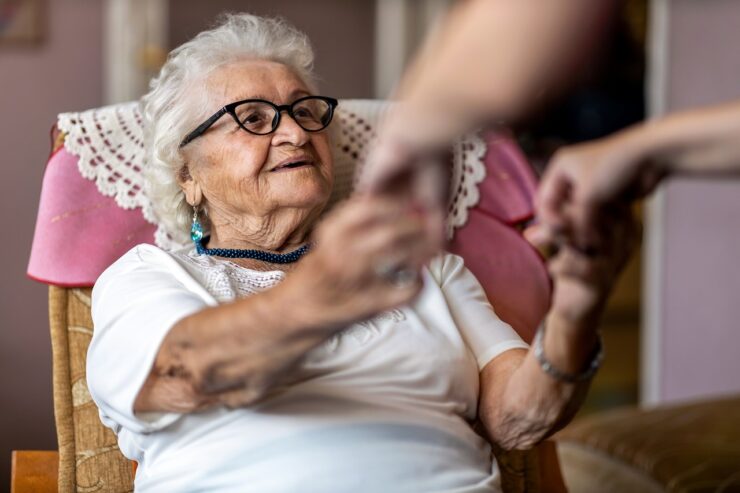Early in the COVID-19 pandemic, the role of caregivers – staff and family who provide care for older and dependent people to carry out activities such as eating or moving – catapulted to the front of our collective conscience. The daily applause for front-line care workers showed a high level of recognition for their incredible work and provided insight into how our health systems must change as our society ages. We need to continue to recognise caregivers as essential to our ageing society. A new report from the OECD provides a powerful message about the need to go beyond applause and address the difficult working conditions currently faced in the long-term care sector in order to better attract, retain and recognise care workers. The report, Beyond Applause? Improving working conditions in Long-Term Care provides key guidance for countries as our economies and societies prepare for the coming demographic transition.
Across the OECD, the number of people over 80 is expected to grow from 57 million in 2016 to over 1.2 billion by 2050. As a result, employment levels in long-term care need to increase by an average of 32% over the next decade. The OECD report powerfully summarises the issue:
“Over the next decades, the demand for long-term care (LTC) workers will increase substantially, mainly driven by population ageing…. Moreover, care needs are becoming increasingly complex because of the rising share of older people with dementia and comorbidities. This increasing complexity requires workers trained with greater clinical, communication, teamwork, digital and management skills. Despite the advance warnings, many countries are insufficiently prepared to absorb these increasing care needs.”
While we need more caregiving jobs, the OECD report also underlines the need for a fundamental reframing of today’s care model. Currently, many home care professionals face challenging working conditions, with levels of pay not matching the value and quality of their work. They also often lack a clear career path as well as access to sufficient training. To meet the demand of our ageing population, we must elevate the status of the caregiving profession globally through the following approaches:
First, recognise that elder caregiving is truly an essential part of healthcare by developing standards around the training and quality of the workforce. This will create a more positive, professional recognition of caregivers, thereby attracting more to the job.
As professional caregivers are better integrated into healthcare systems, they will also help address increasing health costs by reducing hospitalisations, ensuring doctors’ visits happen, and providing a first line of defence in early detection and prevention. These interventions can unlock savings as they enable healthier ageing for many. For example, caregivers trained specifically in the care of older people can help identify early symptoms of heart failure or heart valve disease, play a role in helping to prevent secondary fractures of people suffering from osteoporosis, check vision and hearing deterioration, check that people are taking necessary medicines, and provide support to adult vaccination regimes. Linking these needs to the roles of caregivers will be a key aspect of the ‘UN Decade of Healthy Ageing’ agenda and such a transformation would help to bring about Universal Health Care in ways that are fiscally sustainable.
The second key approach will be to use technology that can truly transform the business of caregiving. According to the OECD report, “The development of new technologies is likely to support and supplement LTC workers, but cannot replace LTC workers entirely for core caregiving tasks. It can help limit the looming shortage of LTC workers by facilitating independent living of older people, reducing the strain of LTC work and raising efficiency in the sector.
Technological tools can help optimise scheduling, training, and communication for the care workforce and can enable scale and sustainability for home care. Such tools can help employers with monitoring and oversight, skills-matching, scheduling, and training. It is also vital to transform the communication between and among care providers, care professionals, care recipients and their families in ways that elevate both the quality of care and its sustainability as a business model. By doing this caregiving can fill that strategic gap between our ageing societies’ demands and caregiver supply.
The third approach is to broaden and deepen the interest in caregiving across society. Every employer has as much interest in improving caregiving for the ageing population today as it did for childcare three to four decades ago. A more robust and professional caregiving workforce for older people takes the pressure off the ‘sandwich generation’, unlocking the economic potential of adults forced to choose between family caregiving and a job. From the C-suite to small business owners around the world, leaders everywhere have a powerful stake in supporting caregiving for older people in the same way they have provided childcare as a workplace benefit to attract and retain employees – combining social value with economic growth. But to achieve this, we must truly go beyond mere words and offer appropriate pay and real training for professional caregivers, as well as tax and other incentives for the employer.
We have reached a milestone that in the history of humanity had been unimaginable: the once extravagant prospect of growing old has become the norm. Our economic, social and healthcare futures hang in the balance of making this new norm a healthier and more enjoyable one.
Michael Hodin is CEO, Global Coalition on Aging and Managing Partner, High Lantern Group.
Francesca Colombo is Head, Health Division, Directorate for Employment, Labour and Social Affairs, OECD.
Seth Sternberg is Co-Founder & CEO, Honor Care.
Source: OECD Forum
 Global Coalition On
Global Coalition On 